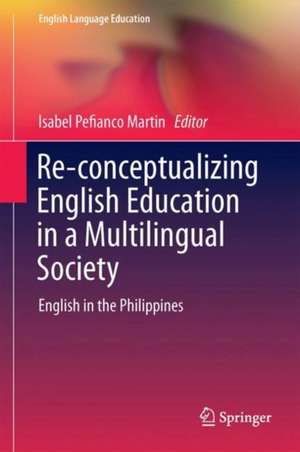Reconceptualizing English Education in a Multilingual Society: English in the Philippines: English Language Education, cartea 13
Editat de Isabel Pefianco Martinen Limba Engleză Hardback – 12 mar 2018
| Toate formatele și edițiile | Preț | Express |
|---|---|---|
| Paperback (1) | 555.79 lei 38-44 zile | |
| Springer Nature Singapore – 15 ian 2019 | 555.79 lei 38-44 zile | |
| Hardback (1) | 643.84 lei 3-5 săpt. | |
| Springer Nature Singapore – 12 mar 2018 | 643.84 lei 3-5 săpt. |
Din seria English Language Education
- 18%
 Preț: 782.72 lei
Preț: 782.72 lei - 24%
 Preț: 846.66 lei
Preț: 846.66 lei - 24%
 Preț: 792.39 lei
Preț: 792.39 lei - 18%
 Preț: 1012.84 lei
Preț: 1012.84 lei - 18%
 Preț: 1008.12 lei
Preț: 1008.12 lei - 18%
 Preț: 1240.16 lei
Preț: 1240.16 lei - 20%
 Preț: 569.55 lei
Preț: 569.55 lei - 15%
 Preț: 643.00 lei
Preț: 643.00 lei - 18%
 Preț: 953.65 lei
Preț: 953.65 lei - 15%
 Preț: 589.02 lei
Preț: 589.02 lei - 15%
 Preț: 648.74 lei
Preț: 648.74 lei - 18%
 Preț: 1119.24 lei
Preț: 1119.24 lei - 18%
 Preț: 1116.57 lei
Preț: 1116.57 lei - 18%
 Preț: 727.00 lei
Preț: 727.00 lei - 18%
 Preț: 777.20 lei
Preț: 777.20 lei -
 Preț: 390.08 lei
Preț: 390.08 lei - 15%
 Preț: 636.30 lei
Preț: 636.30 lei - 18%
 Preț: 1115.63 lei
Preț: 1115.63 lei - 18%
 Preț: 894.79 lei
Preț: 894.79 lei - 15%
 Preț: 637.28 lei
Preț: 637.28 lei - 18%
 Preț: 941.68 lei
Preț: 941.68 lei - 18%
 Preț: 724.17 lei
Preț: 724.17 lei - 18%
 Preț: 886.62 lei
Preț: 886.62 lei - 18%
 Preț: 885.63 lei
Preț: 885.63 lei - 18%
 Preț: 721.19 lei
Preț: 721.19 lei -
 Preț: 391.79 lei
Preț: 391.79 lei - 18%
 Preț: 784.48 lei
Preț: 784.48 lei -
 Preț: 389.31 lei
Preț: 389.31 lei - 18%
 Preț: 1115.28 lei
Preț: 1115.28 lei
Preț: 643.84 lei
Preț vechi: 757.46 lei
-15% Nou
Puncte Express: 966
Preț estimativ în valută:
123.22€ • 128.16$ • 101.72£
123.22€ • 128.16$ • 101.72£
Carte disponibilă
Livrare economică 24 martie-07 aprilie
Preluare comenzi: 021 569.72.76
Specificații
ISBN-13: 9789811075261
ISBN-10: 9811075263
Pagini: 190
Ilustrații: X, 226 p. 20 illus.
Dimensiuni: 155 x 235 mm
Greutate: 0.51 kg
Ediția:1st ed. 2018
Editura: Springer Nature Singapore
Colecția Springer
Seria English Language Education
Locul publicării:Singapore, Singapore
ISBN-10: 9811075263
Pagini: 190
Ilustrații: X, 226 p. 20 illus.
Dimensiuni: 155 x 235 mm
Greutate: 0.51 kg
Ediția:1st ed. 2018
Editura: Springer Nature Singapore
Colecția Springer
Seria English Language Education
Locul publicării:Singapore, Singapore
Cuprins
Introduction.- 1 Re-conceptualizing English education in multilingual Philippines.- Part 1 English: Policy, Ideology, and Identity.- 2 English in multilingual settings: Features, roles and implications.- 3 The supremacy of English in Philippine language education policy.- 4 Critiquing Mother Tongue-based language-in-education Policies: A focus on the Philippines.- 5 Anguish as Mother Tongue: English in a multilingual context.- 6 Teacher ideology in English Language Education.- Part 2 Teaching English, Teaching in English.- 7 An endocentric approach to English Grammar teaching.- 8 Using Filipino in an English classroom: Teaching with resistance and relevance.- 9 English in the teaching of Mathematics: Policies, realities, and opportunities.- 10 The technicist framework and the teaching of speech communication in the Philippines.- 11 Migrant workers, language learning, and spaces of globalization: The case of Filipino Maritime Professionals.- Synthesis.- 13 English in Education in the Philippines: From research to policy.
Notă biografică
Isabel Pefianco Martin is an associate professor and chair of the Department of English at the Ateneo de Manila University, Philippines. She is a leading figure in English-language studies in the country, having published in various internationally recognized publications on topics ranging from world Englishes, Philippine English, English-language education, English sociolinguistics and language policy to forensic linguistics, and language and law studies. She has held longtime leadership positions in the Linguistic Society of the Philippines (LSP) and now serves as an advisor on the LSP board. She has served and continues to serve in private and government institutions that are concerned with upgrading English-language education in the Philippines.
Textul de pe ultima copertă
This book brings together chapters that describe, investigate, and analyze the place of English in education in multilingual Philippines. Unlike most studies on languages in education, which take a neutral, de-contextualized stance, this volume take a pluricentric view of the English language by positioning it in relation to its varieties, as well as to other languages in the country. Because of the changing realities of English in the Philippines, traditional assumptions about the language as monolithic and unchanging, as well as about how it should be taught and learned, need to be revisited and re-conceptualized.
Caracteristici
Challenges traditional assumptions of the English language as monolithic and unchanging Opposes a neutral, de-contextualized approach to English-language teaching and learning in the Philippines Presents changing realities of the English language and how it should be taught and learned in the Philippines
